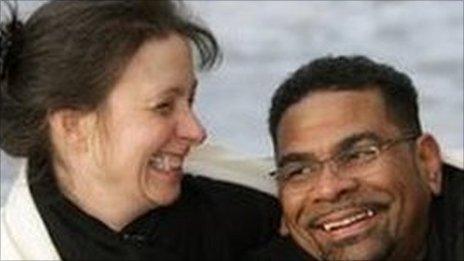Debbie Purdy: Pain 'too much' for right-to-die campaigner
- Published
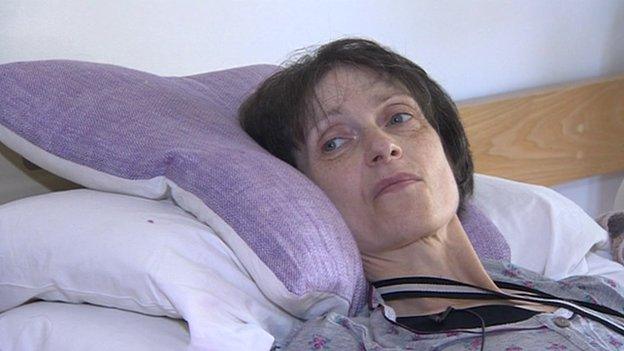
Debbie Purdy said in her final interview the pain of multiple sclerosis was "never-ending"
As one of the most prominent right-to-die campaigners, Debbie Purdy made legal history in her battle to have the law on assisted suicide clarified.
In 2009 the multiple sclerosis (MS) sufferer from Bradford won a ruling, external to get clarification on whether her husband Omar Puente would be prosecuted if he accompanied her to Dignitas, the Swiss assisted-suicide organisation.
At the time, travelling to Switzerland to end her life was a journey she imagined undertaking. But by the summer of 2013 her decision had changed.
The 51-year-old's condition, which was diagnosed as primary progressive MS, had deteriorated significantly and she was barely able to leave her house.
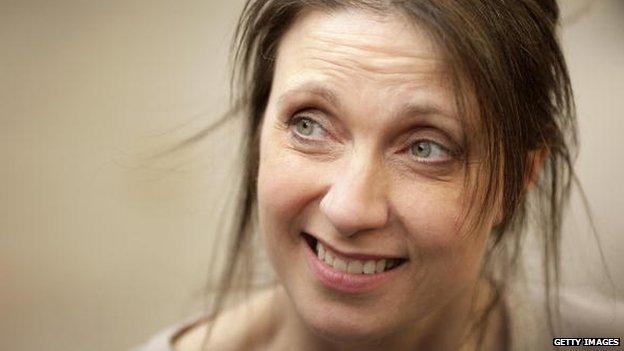
Ms Purdy had spent the last year at the Marie Curie Hospice in Bradford
She told BBC Look North: "The pain of this disease is never-ending. Since I was diagnosed in 1995 it's only ever got worse.
"It's not the choice between living and dying. The choice is between extreme pain and discomfort."
In December 2013 Ms Purdy entered the Marie Curie hospice in Bradford and decided to try to end her life by refusing food. The hospice, however, continued to offer it to her.
A process she had hoped would be quick was to last for a year.
In July, in her final interview with BBC Look North, Ms Purdy said: "It's been so much more difficult than I thought it would be.
"It's a lot more painful than I thought and Marie Curie aren't prepared to make it easy for me.
"They are prepared to support me and help me with pain medication and so on.
"But if I give in at any point and say 'I want something to eat or drink'... they're not prepared to not give me food or drink and that means I've got to be a lot stronger and more motivated.
"One weak moment can put me back a week."
But she said it was preferable to living with her debilitating form of MS.
"I haven't been out of bed in two and a half years because I can't sit up properly without feeling very sick.
"I can't see properly any more, I can't use the computer too much, my voice recognition system keeps not recognising my voice now - which is limiting - and to disagree with me is to condemn me to 30 years of this."
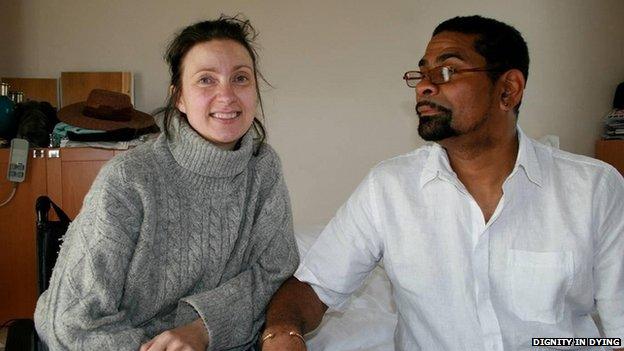
Debbie Purdy challenged the law on assisted suicide to protect husband Omar Puente if he helped her die
However, the issue of assisted suicide - the issue she fought so long for to clarify in law - does divide opinion.
Baroness Jane Campbell is a disability rights campaigner and founder of Not Dead Yet UK, a network of disabled people in the UK who oppose the legalised killing of disabled people.
In June 2014, she told the BBC: "Campaigners for a change in the law on assisted suicide present it as an extension of choice, giving those with chronic illness or disability the same "right" to end their lives as the rest of the population.
"When any other person seeks to end their life, we do not assist them. We help those with suicidal thoughts look for positives in their lives.
"I believe chronically ill and disabled people deserve that 'right', to be helped by us all to live their lives.
"As a severely disabled person, I fear a change in the law to permit assisted dying. Those arguing for a change do not offer any guidance as to who might be included or excluded from obtaining assistance."
Ms Purdy earned a reputation as one of Britain's most outspoken activists in the legal battle over assisted suicide.
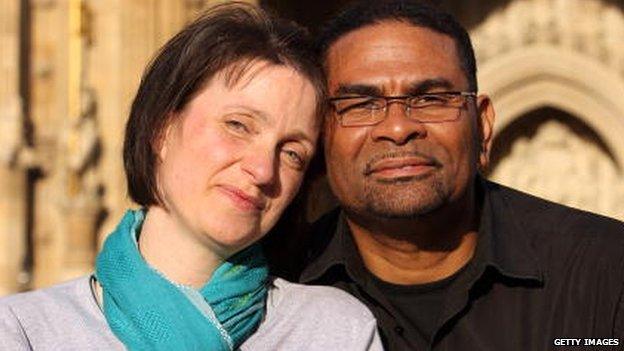
Throughout Ms Purdy's illness, her focus remained on her husband Omar
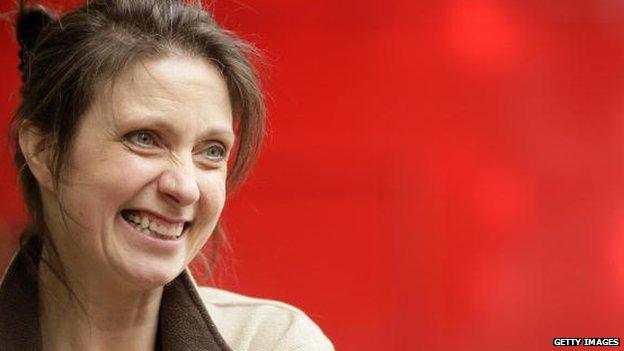
In her final interview, Ms Purdy said refusing food and drink had been "more painful" than she expected
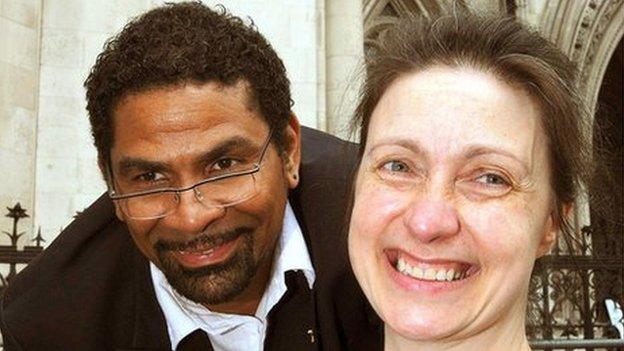
Debbie Purdy won a landmark legal victory in 2009
With the support of her husband, she began her quest in 2008 by launching a High Court bid to force the Crown Prosecution Service (CPS) to clarify exactly what actions would lead to a friend or relative being charged under the 1961 Suicide Act.
Despite losing this and a subsequent Court of Appeal case, she scored a legal victory in 2009 when she forced the Department for Public Prosecutions to clarify assisted suicide circumstances, although the law remained unchanged.
The following year, Director for Public Prosecutions Keir Starmer outlined 16 factors which would tend to lead to prosecution of those who helped with a suicide.
Ms Purdy said: "Every time I've smiled or laughed in the last four years it has been a result of winning at the House of Lords."

Law around the UK
In England and Wales it is an offence to encourage or assist a suicide, or a suicide attempt
The law is almost identical in Northern Ireland
In Scotland there is no specific law on assisted suicide, although in theory someone could be prosecuted under homicide legislation

Lord Falconer's Assisted Dying Bill, external is currently working its way through Parliament. The proposed legislation would allow doctors to prescribe a lethal dose to terminally ill patients judged to have less than six months to live.
But although some could view this as the next step in Ms Purdy's battle, she felt it did not go far enough.
"I think Lord Falconer, in saying that if you're within the last six months of your life, misses the point that Tony Nicklinson, myself, Paul Lamb - the people whose cases have all been public - all have to face decades of a life that we don't consider acceptable, and that is the thing I find hardest.
And she felt the proposals put too much pressure on doctors to make the final decision.
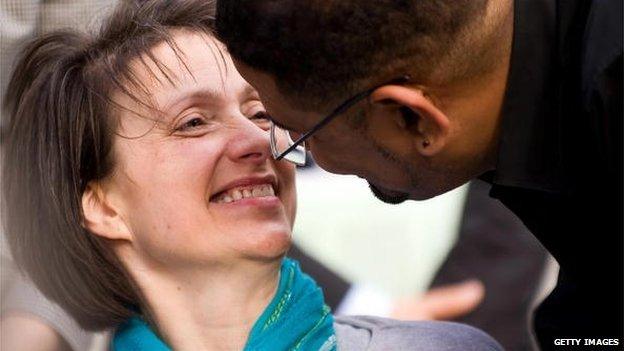
Mr Puente paid tribute to "a much loved wife, sister, aunt and friend"
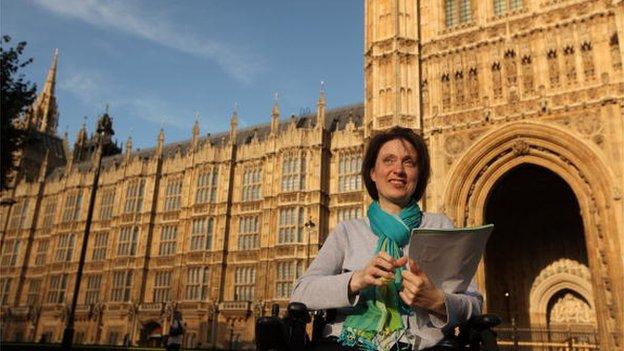
Debbie Purdy said the only time she had smiled in recent years was because of "winning" at the House of Lords
"What Marie Curie have made me go through over the last couple of years in terms of seeing psychiatrists, personal care, friends, family, the support they've given my partner, the conversations we've gone through... I think they should be the ones telling our politicians how to design a law, not a couple of lawyers," she said.
Throughout Ms Purdy's illness, her focus remained on her husband and how her illness and decisions impacted on him.
"My decision and my illness doesn't only affect me. It affects Omar, and the fact that the hospice staff, nurses, doctors, carers are prepared to give the support to Omar that he needs has been massively important both to me and to the people around him," she said.
"It sometimes makes it harder to know I'm letting down people who are prepared to care for me, but they're prepared to care for me even if I make choices they wouldn't make.
"The choice that I make is to die, maybe it's not the choice other people would make, but it's my choice."
- Published29 December 2014
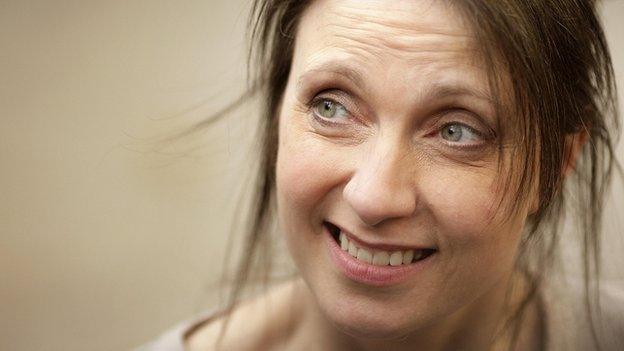
- Published31 July 2013

- Published7 May 2013
- Published21 October 2012
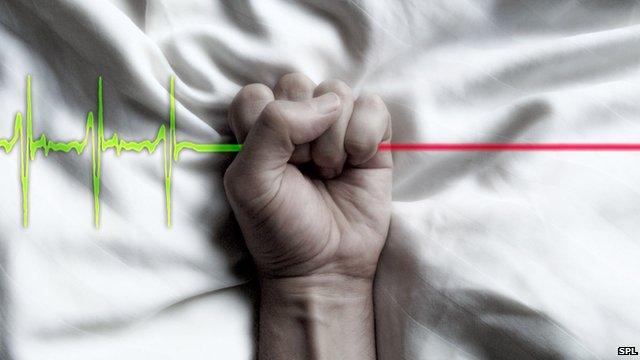
- Published25 January 2012
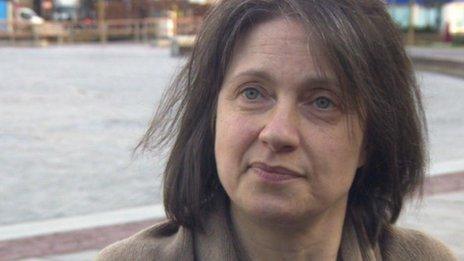
- Published23 May 2011
